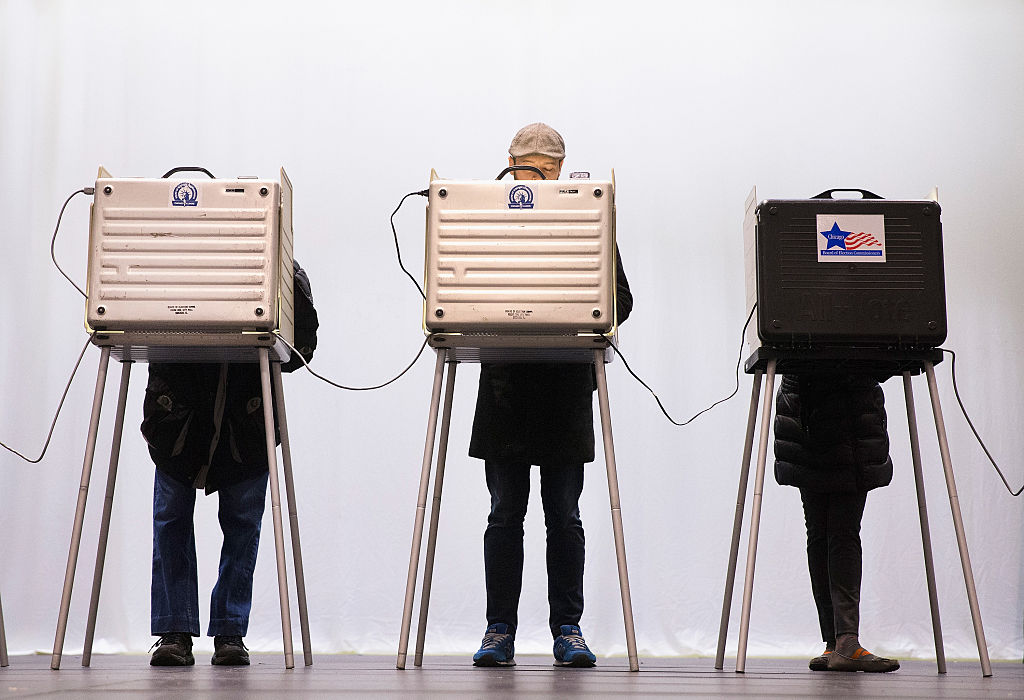Did Russia keep Americans from voting? Authorities don't know, and they're not trying very hard to find out.

A free daily email with the biggest news stories of the day – and the best features from TheWeek.com
You are now subscribed
Your newsletter sign-up was successful
For as much attention as Russian interference in the 2016 presidential election has gotten, many potential state-level disruptions have gone largely unexamined.
The New York Times reported Friday that questions were raised in numerous states about the possibility of Russian interference with the "back-end election apparatus," which includes "voter-registration operations, state and local election databases, e-poll books, and other equipment." In Durham, North Carolina, for instance, "dozens" of people were told they were ineligible to vote even though they had current voter registration cards; some voters "were told incorrectly that they had cast ballots days earlier"; and some were "rejected" after being sent "from one polling place to another."
Yet, authorities on the federal, state, and local levels haven't done much to look into these occurences:
The Week
Escape your echo chamber. Get the facts behind the news, plus analysis from multiple perspectives.

Sign up for The Week's Free Newsletters
From our morning news briefing to a weekly Good News Newsletter, get the best of The Week delivered directly to your inbox.
From our morning news briefing to a weekly Good News Newsletter, get the best of The Week delivered directly to your inbox.
Intelligence officials in January reassured Americans that there was no indication that Russian hackers had altered the vote count on Election Day, the bottom-line outcome. But the assurances stopped there.Government officials said that they intentionally did not address the security of the back-end election systems, whose disruption could prevent voters from even casting ballots.That's partly because states control elections; they have fewer resources than the federal government but have long been loath to allow even cursory federal intrusions into the voting process. [The New York Times]
On top of that, Michael Daniel, the cybersecurity coordinator in the Obama administration, noted that it would require "a lot of forensics, a lot of research and investigation," to find out whether the problems "were an accident, or the random problems you get with computer systems, or whether it was a local hacker, or actual malfeasance by a sovereign nation-state." Even then, Daniel said, it could be tough to know for sure.
But academic and private election security experts argued that this is the type of question worth devoting resources toward answering. Susan Greenhalgh, a troubleshooter at a nonpartisan election monitoring group who witnessed Election Day disruptions in Durham, pointed out that "messing with the e-books to keep people from voting" could be just as detrimental as messing with the vote totals. "We still don't know if Russian hackers did this," Greenhalgh said. "But we still don't know that they didn't."
Read more at The New York Times.
A free daily email with the biggest news stories of the day – and the best features from TheWeek.com
-
 The Gallivant: style and charm steps from Camber Sands
The Gallivant: style and charm steps from Camber SandsThe Week Recommends Nestled behind the dunes, this luxury hotel is a great place to hunker down and get cosy
-
 The President’s Cake: ‘sweet tragedy’ about a little girl on a baking mission in Iraq
The President’s Cake: ‘sweet tragedy’ about a little girl on a baking mission in IraqThe Week Recommends Charming debut from Hasan Hadi is filled with ‘vivid characters’
-
 Kia EV4: a ‘terrifically comfy’ electric car
Kia EV4: a ‘terrifically comfy’ electric carThe Week Recommends The family-friendly vehicle has ‘plush seats’ and generous space
-
 Nobody seems surprised Wagner's Prigozhin died under suspicious circumstances
Nobody seems surprised Wagner's Prigozhin died under suspicious circumstancesSpeed Read
-
 Western mountain climbers allegedly left Pakistani porter to die on K2
Western mountain climbers allegedly left Pakistani porter to die on K2Speed Read
-
 'Circular saw blades' divide controversial Rio Grande buoys installed by Texas governor
'Circular saw blades' divide controversial Rio Grande buoys installed by Texas governorSpeed Read
-
 Los Angeles city workers stage 1-day walkout over labor conditions
Los Angeles city workers stage 1-day walkout over labor conditionsSpeed Read
-
 Mega Millions jackpot climbs to an estimated $1.55 billion
Mega Millions jackpot climbs to an estimated $1.55 billionSpeed Read
-
 Bangladesh dealing with worst dengue fever outbreak on record
Bangladesh dealing with worst dengue fever outbreak on recordSpeed Read
-
 Glacial outburst flooding in Juneau destroys homes
Glacial outburst flooding in Juneau destroys homesSpeed Read
-
 Scotland seeking 'monster hunters' to search for fabled Loch Ness creature
Scotland seeking 'monster hunters' to search for fabled Loch Ness creatureSpeed Read